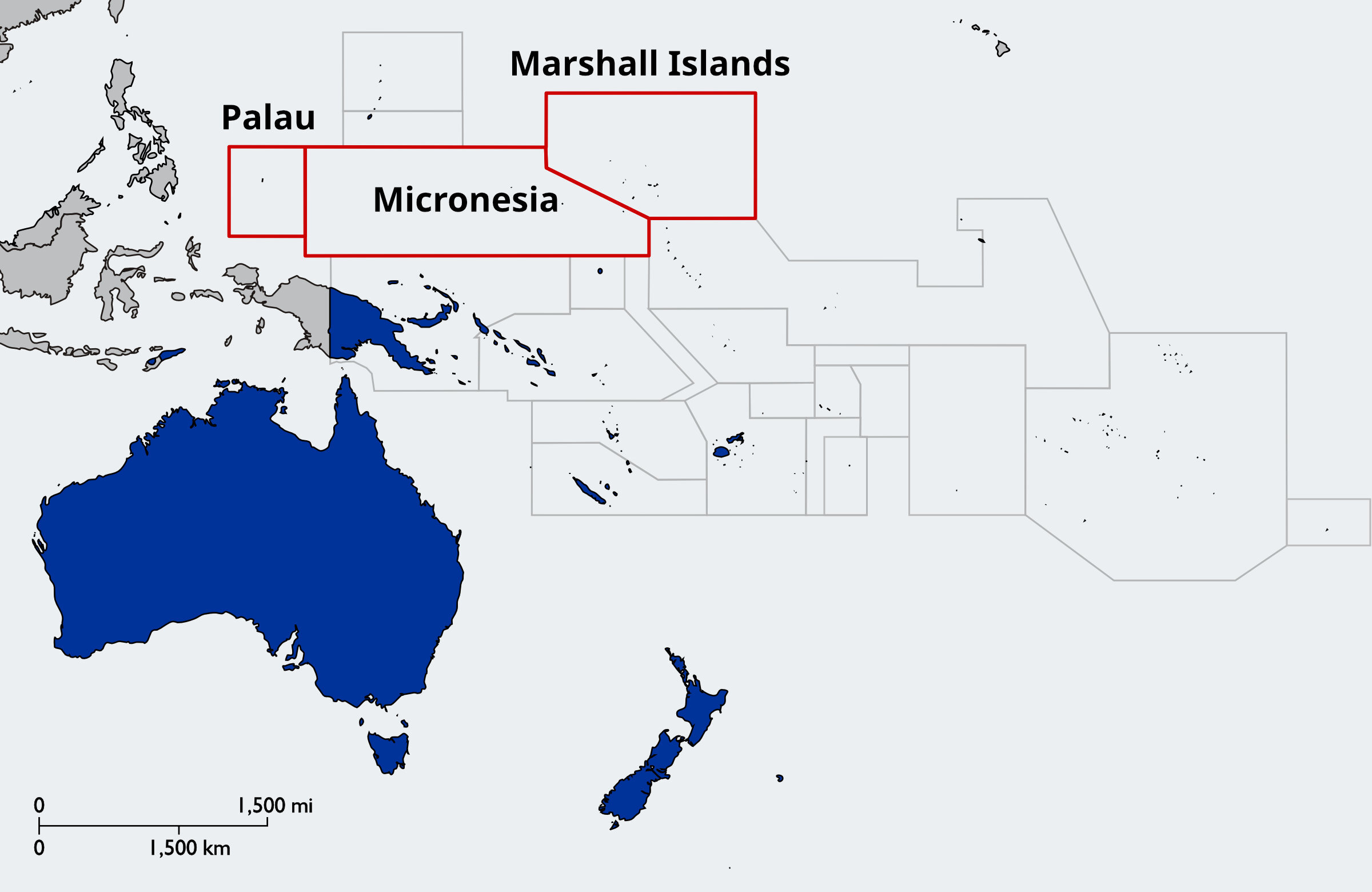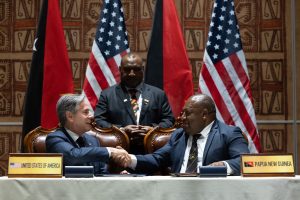While disappointment lingered over U.S. President Joe Biden’s decision to cancel his trip to Papua New Guinea, U.S. Secretary of State Antony Blinken attended meetings in Port Moresby in his stead. While the symbolism of the first visit by a sitting U.S. president to the Pacific Islands was deeply missed, the trip still marked key advances for U.S. partnerships in the region.
Among the major deliverables, the United States signed a new security pact with Papua New Guinea on Monday, seen as a key victory in the competition with China for strategic influence.
Papua New Guinea’s location just north of Australia makes it strategically significant. It was the site of fierce battles during World War II, and with a population of nearly 10 million people, it’s the most populous Pacific Island nation.
The State Department said the new agreement provides a framework to help improve security cooperation, enhance the capacity of Papua New Guinea’s defense force, and increase regional stability. The full agreement will be made public once politicians in both countries have an opportunity for input, likely in a couple of months.
“The work that we’re doing together to try to shape the future could not be more important, could not be more timely,” U.S. Secretary of State Antony Blinken told reporters. “We’re deeply invested in the Indo-Pacific because our planet’s future is being written here. Papua New Guinea is playing a critical role in shaping that future.”
Papua New Guinea Prime Minister James Marape said the pact is mutually beneficial and “secures our national interests” in “becoming a robust economy in this part of the world.”
But the agreement sparked student protests in the second-largest city, Lae. And many in the Pacific are concerned about the increasing militarization of the region.
Student Naomi Kipoi, 17, said she was opposed to the security pact because she felt it means the United States could come to her country whenever it pleased without permission. She said China had been a big help to her country by building roads and funding schools.
“The U.S. didn’t help us with aid and other things,” Kipoi said. “They’re just trying to sign the agreement.”
Last year, nearby Solomon Islands signed its own security pact with China, a move that raised alarm throughout the Pacific. Washington has increased its focus on the Pacific, opening embassies in Solomon Islands and Tonga, reviving Peace Corps volunteer efforts, and encouraging more business investment.
But some have questioned how reliable a partner the United States is in the Pacific, particularly after Biden canceled his plans to make a historic stop in Papua New Guinea to sign the pact. Biden ended up canceling trips to Papua New Guinea and Australia to focus on the debt limit talks back at home.
Blinken traveled in Biden’s place, arriving in Papua New Guinea early Monday. In response to news of Blinken’s impending visit, China warned against the introduction of “geopolitical games” into the region.
As well as the defense pact, the United States also signed a maritime agreement with Papua New Guinea which will allow the U.S. Coast Guard to partner with the Pacific nation to counter illegal fishing and drug smuggling.
Also while in Papua New Guinea, Blinken will oversee signing ceremonies for renewed Compacts of Free Association (COFAs) with Palau and the Federated States of Micronesia (FSM).
The COFA with Palau “will ensure that this partnership continues to deliver for our people, including by tackling the climate crisis, promoting sustainable economic development, bolstering our security,” Blinken said in remarks at the signing ceremony on Monday.
“These same goals animate the agreement that we’ll sign with the Federated States of Micronesia [on Tuesday] and the one that we’re working hard to finalize with the Republic of the Marshall Islands,“ he added.
As part of the new agreements, Blinken said that the United States would provide $7.1 billion in aid to the COFA partners over the next 20 years.
The United States has had COFAs with the Republic of the Marshall Islands (RMI), FSM, and Palau since the mid-1980s, when the erstwhile U.S. “trust territories” gained independence. All three COFAs were originally due to expire in the next year (the RMI’s and FSM’s by the end of this year, and Palau’s in 2024), before the signing of renewed pacts with Palau on Monday and the FSM on Tuesday.
Talks with the RMI on COFA renewal are still ongoing, in part due to the toxic (literally and figuratively) legacy of U.S. nuclear tests within the islands.
The agreements give the United States exclusive rights to deploy military assets within its COFA partners’ land and territorial waters. The U.S. plans to establish a new military base in the FSM, while Palau has expressed its willingness to host military facilities as well. In exchange, Washington commits to providing permanent financial assistance to its COFA partners, as well as allowing their nationals to freely live and work in the United States.
The three Pacific Island countries have a crucial geostrategic location to the north of Papua New Guinea and east of the Philippines – putting them among the Pacific Island countries closest to Taiwan.

Blinken’s visit to Papua New Guinea coincided with a trip by Indian Prime Minister Narendra Modi, who was hosting a meeting with Pacific Island leaders to discuss ways to better cooperate. Biden was supposed to capitalize on that opportunity to hold a meeting with leaders of the Pacific Islands Forum; instead, Blinken attended that meeting in the president’s place. To assuage the disappointment, Blinken conveyed to the assembled Pacific Island leaders “a formal invitation from the President for Pacific leaders to come back to Washington this fall for a second summit to continue conversations and develop new initiatives that are critical to our collective future.”
In addition to the first U.S.-Pacific Islands Country summit held in Washington in September 2022, Blinken made a rare trip to Fiji in February 2022. In his remarks to the PIF leaders on Monday, Blinken highlighted those efforts and more:
Last year, we inaugurated our new embassy building here in Papua New Guinea… We recently opened two new embassies in Solomon Islands and Tonga. We’re working to do the same in Vanuatu in Kiribati. We sent our first ever U.S. envoy to the Pacific Islands Forum, Ambassador Frankie Reed… America’s future is here in the Pacific.
But it was a bit difficult to square the end of Blinken’s remarks – promising “to ensure that the United States is a strong, reliable, effective partner in the Pacific Islands” – with the opening of his speech, where he had to address the elephant in the room: “President Biden was very much looking forward to being here and to addressing Pacific Island Forum leaders before events in Washington required him to be there.”

































